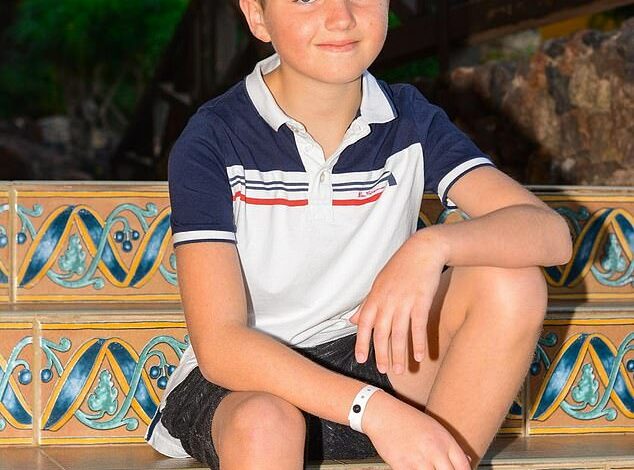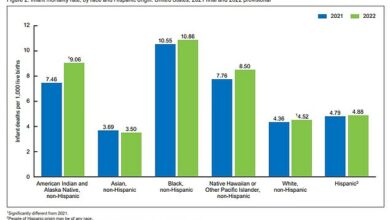Gamer, 11, was told neck pain was due to ‘too much screen time’ but actually had a brain tumor






Like many youngsters his age, 11-year-old Ronnie Hood loved to play video games on his phone on the weekends.
When he started experiencing neck pain, his doctor suggested it was likely due to the tension caused by bending over to look at his phone.
But the real cause turned out to be an incurable and fatal cancer that was growing ‘like an octopus’ around his brain stem.
Sadly, the outlook is poor and the boy from Sudbury, Suffolk, is thought to have only a few months to live.

Schoolboy Ronnie Hood, like many youngsters his age, loved playing video games on his phone

So when he started experiencing neck pain, his GP simply ordered him to see a physiotherapist, as the 11-year-old was spending too much time on his phone. Ronnie pictured with a video game and the Nintendo Switch handheld gaming device
Ronnie had been suffering from unbearable neck pain for a year when his parents took him to the doctor.
The sixth-grader was then referred to a physiotherapist for help with what was suspected to be an RSI.
But the physiotherapy exercises left him ‘crying in pain’ and because his symptoms did not improve, his parents Vicky, 50, and Nick, 58, requested an MRI scan.
This examination was conducted in February and revealed an octopus-shaped tumor on his brain, near the top of his spine.
Further investigation revealed it was a diffuse midline glioma (DIPG), a rare form of brain tumour that affects only 20 to 30 children a year in the UK. Most cases occur in children aged between five and 10.
The disease grows in the midline, between the two hemispheres of the brain, and most people who develop it within a year die from it.
Only two percent of patients survive five years after their diagnosis. On average, patients diagnosed with DIPG can expect to survive eight to eleven months.
Nick said finding out his son had brain tumors was like “getting hit by a bus.”
“Ronnie didn’t get better. He was crying from the pain and frustration and then he had numbness in his right hand,” he said.
“When we got the MRI results, we couldn’t believe the news that he had brain tumors. It was like we had been hit by a bus.”
“He is a handsome, confident and loved little boy who was fit and healthy. How could this happen?”
Ronnie has already had surgery and radiotherapy, but other treatment options for DIPG in the UK are limited.
However, his parents are pinning their hopes on a drug called ONC201. This drug is currently being tested in the US and has shown promising results in fighting the specific type of tumour that Ronnie has, namely a mutation called H3K27.
They have set up a GoFundMe to raise £50,000 so they can travel across the Atlantic to privately fund the treatment.
Nick, who runs a courier company, said: ‘Ronnie has a rare mutation of this type of tumour, which means there aren’t many treatment options here in the UK.

But the real cause turned out to be an incurable and fatal cancer that grew ‘like an octopus’ around his brain stem

Ronnie has already had surgery and radiotherapy, but other treatment options for DIPG in the UK are limited

Ronnie, who is unable to return to school, is given a high dose of steroids to reduce the swelling around the tumour. However, an unfortunate side effect of these drugs is that his face and stomach are ‘bloated’ as a result
‘He can only tolerate a limited amount of radiation and the oncologist said that chemotherapy is pointless in his case.
‘At the moment, Ronnie has to grow first before treatment can be started, before the tumor is eligible for Ronnie.
“This seems counterproductive. We’re trying to be proactive in extending Ronnie’s life. We don’t want to sit around and wait for this to take our boy away.”
So far, GoFundMe has raised £14,000 of its £50,000 target.
Ronnie can no longer go to school and is therefore given a high dose of steroids to reduce the swelling around the tumor.
An annoying side effect of these medications is that his face and stomach are ‘bloated’ as a result.
Katy-Jade Church family, who GoFundMe page, said: ‘Ronnie is at an age where he is becoming increasingly conscious of his appearance. He finds these side effects particularly distressing and is becoming less and less keen to see his friends and leave the house.
‘The steroids also affected his ability to sleep and understandably made him irritable.’
Nick added: ‘In the four months since Ronnie was diagnosed with DIPG, his appearance has changed dramatically.
‘He can walk and talk, but that is becoming increasingly difficult. In March, he could no longer go to school due to the severe side effects of the tumor and the medication.
“No one should have to deal with these devastating consequences of brain tumors, let alone a child.”
Charlie Allsebrook, community development manager at the charity Brain Tumour Research, said: “It is heartbreaking to hear of Ronnie’s diagnosis.
“It’s a painful reminder that brain tumors are non-discriminatory; they can strike anyone at any age.
‘It is terrible that patients and their families feel forced to take control of their own treatment.
‘If we are to find kinder treatments and ultimately a cure for all types of brain tumours, we need to invest in research in the UK to improve outcomes, so parents like Nick and Vicky don’t have to face the reality of losing their child to a brain tumour.’




